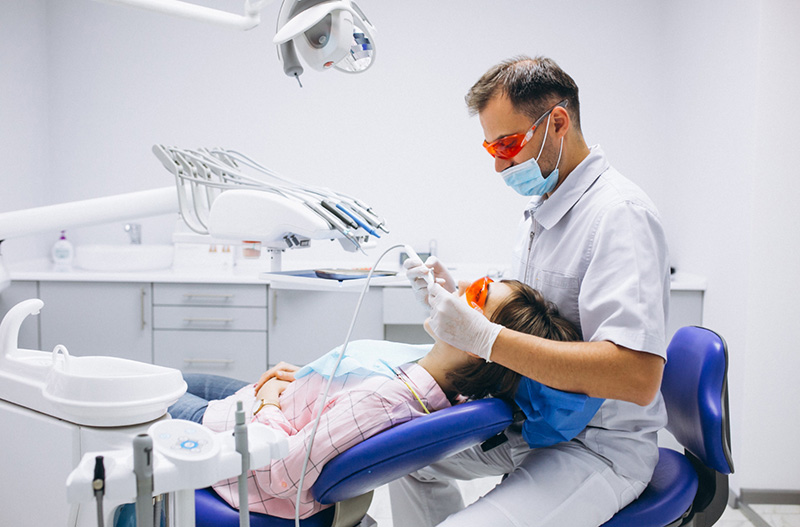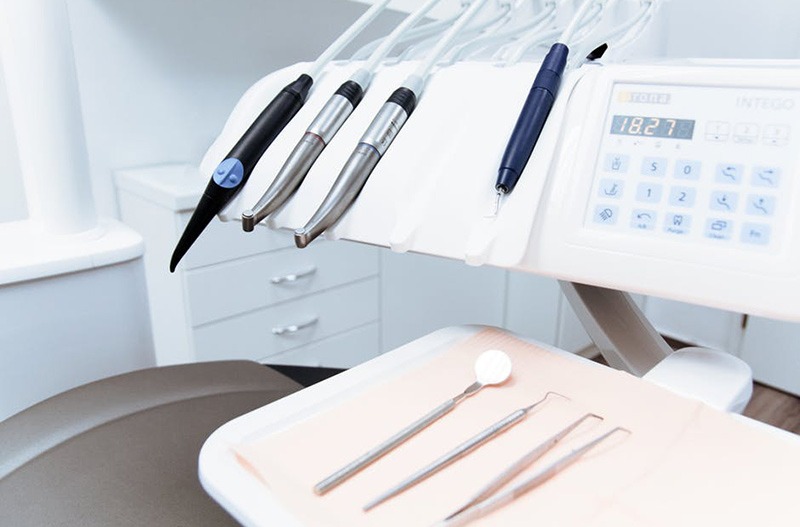Wednesday, June 1st, 2022

In the late 1990s and early 2000s, it seemed that smoking was on the decline in Canada. British Columbia was no exception but unfortunately, this is a trend that now appears to be reversing. The latest figures show that at least 15% of the population here smokes.
There are many good reasons to visit a dentist in Coquitlam, but if you're a smoker then this is especially important to do on a regular basis. You're probably well aware of how smoking can affect your physical and mental health, but how does smoking affect your teeth?
That's what we're going to be discussing today. Read on to see if it might be time for you to schedule a dental check up in Coquitlam.
Let's start off with something on the less serious side of things. Smoking is renowned for causing discoloration in teeth.
Your teeth are made out of enamel and this enamel has microscopic cracks on its exterior. Every time you smoke a cigarette the nicotine and tar contained inside settle into these cracks.
Over time this is guaranteed to cause discoloration. Usually, you'll notice a yellow or brown color developing.
If you have discolored teeth from smoking you will eventually have to address the root cause of the issue by kicking the habit. But in the meantime, you can try a teeth whitening treatment.
If you're a smoker then you're automatically at risk of developing gum disease. This is because smokers have higher bacterial plaque production rates. Over time it's this plaque that can lead to gum disease, which often results in tooth loss.
What's worse is that because smoking restricts levels of oxygen in your bloodstream your infected gums have a harder time healing. It's for this same reason that smokers often have a more difficult time healing from dental surgeries and treatments.
Of course, one of the more serious consequences of smoking is an increased risk of developing several different types of cancers. This includes oral cancer.
Did you know that smokers are 10 times more likely to develop oral cancer than non-smokers? While dentists don't directly treat oral cancer, they are able to spot signs of it and are integral in relaying different treatment options to you and coordinating with other medical professionals.
Nobody likes that one person who always has bad breath—you definitely don't want to be that person either. But it's a fact that smokers are prone to chronic cases of halitosis. It's a condition called smoker's breath, and short of giving up smoking entirely, it can be very difficult to treat.
Everyone should visit their dentist on a regular basis, but if you're a smoker you should take extra special care of your oral health. If you'd like to visit a dentist in Coquitlam, we'd be happy to see you. Get in touch to book your appointment at your earliest convenience.
Friday, April 1st, 2022

According to the CDC, 47% of American adults over 30 struggle with gum disease. That number jumps to 70% of adults over age 65. It may be the most common diagnosis made at a dental checkup.
In its early stages, gum disease (gingivitis) makes gums swell with inflammation, which can hurt and cause bleeding. As it worsens, patients can lose their teeth. Most urgently, gum disease can expose patients to serious infections that damage the bones, lungs, and even the heart.
Fortunately, there are preventative measures and treatments—including deep cleaning. It's wise to talk to your local dentist in Coquitlam, BC, to learn what treatment options are right for you.
That said, there are some broad guidelines to explore if you're wondering, "When does gum disease require deep cleaning?" Read on to learn about the stages of gum disease, and how deep cleaning works to help.
Gum disease starts with oral bacteria. Ideally, you'll be able to prevent gum disease before it ever happens. Oral hygiene is key to prevention.
That said, it's important to intervene as early as possible if you have it.
The best preventative measures are to brush and floss your teeth at least twice a day, and to see a dentist once or twice each year. It's wise to see a dentist more often if you're at higher risk of gum disease. Medications that cause dry mouth, hormonal treatments, and stress can elevate your risk.
If your risk is high, you can use mouthwash in addition to brushing and flossing.
Studies have demonstrated certain mouthwashes can further decrease the risk of gum disease. These can also help treat gum disease by reducing its severity. According to one recent analysis, the most effective mouthwashes typically include one or more of these ingredients:
Other studies have demonstrated the efficacy of Aloe vera as a mouthwash ingredient. It can improve dental health and soothe irritated tissue at the same time.
If you have early-stage gum disease, or your disease's severity is mild to moderate, a deep cleaning is the right treatment. Deep cleaning is scaling and root planing. Typically, dentists use local anesthetics, like novocaine, so the treatment is painless.
During a deep cleaning, the dentist uses manual and electric tools to remove the plaque from teeth. The process specifically removes plaque deposits that form in deep pockets of the gums. The deposits are the primary source of the germs that cause gum disease.
Deep cleaning pulls the gums from the roots of the teeth. After deep cleaning, the dentist will smooth out the roots, which encourages the gums to re-attach to the roots.
Dentists may prescribe an aftercare regimen after the deep cleaning is complete. This can involve prescription-strength toothpaste and mouthwash. You may be asked to avoid certain foods.
Once gum disease has progressed and become severe, a deep cleaning may not be enough. At this stage, you may have already lost teeth and experience severe pain. A dentist will generally prescribe oral antibiotics to get the bacterial infection under control.
Once antibiotics start working, it's possible deep cleaning is still an option. But, more often, clinicians must address severe gum disease with debridement.
In some cases, debridement cannot be safely performed in a dentist office. This is an oral surgery that removes damaged or diseased tissue.
Dentists treat the most serious cases with gingivectomy or gingivoplasty surgeries. This removes diseased gum tissue and shapes healthy gum tissue.
Catch gum disease early with a dentist you trust. Get your next dental checkup right here, from a dentist in Coquitlam. Book an appointment by phone, or contact us online today.
Tuesday, March 1st, 2022

Have you ever experienced a dental infection?
Dental infections, or dental abscesses, arise when a tooth is exposed to bacteria. Even simple cavities can result in dental abscesses when they're left untreated.
We're here to talk about dental infections and how a trip to your local dentist in Coquitlam can help you prevent them. Read on to learn more.
Why Are Dental Infections So Dangerous?
Dental infections don't only affect your teeth and gums.
While infections start in the mouth, they're quick to spread. Your infection can spread throughout your body and even to your brain (after all, your mouth and your brain aren't that far apart).
Dental infections don't have to be serious to cause those problems. Even a bad untreated cavity or a crack in a tooth can lead to a dental disaster.
Aside from the obvious pain that comes alongside a dental infection, there are several health problems that can arise if you don't get treatment from your local dentist.
A tooth infection can turn into a jaw infection which is harder to treat. You'll notice significant swelling and pain. Tooth infections can also turn into sinus irritation.
In more serious cases, a tooth infection could trigger Ludwig's Angina. This can cause your neck and throat to swell, which will make it harder to breathe, speak, and eat.
In the most serious cases, an untreated dental abscess could lead to meningitis.
So how can you know if you have a dental abscess? What are the dental infection symptoms that you should look out for?
First, keep in mind that infections don't always cause pain, at least not right away. If you've had a root canal, or if you have a dental implant infection, you may not feel it because your nerve is dead.
In most cases, you'll experience at least some discomfort and inflammation. Most of the time patients will experience pain, and that pain will increase with pressure or hot and cold temperatures.
It's common to feel ill when you have a dental abscess and you may have a fever.
People with dental infections often have bad breath and they may find it difficult to open their mouths, eat, and sleep.
Although problems can arise after dental emergencies (like cracked teeth), most dental infections can be avoided if you regularly visit your dentist.
One in four adults has at least one untreated cavity. While a cavity is "no big deal" when it first forms, it can turn into a dental abscess if it's allowed to grow.
When you visit your local dentist, they'll be able to identify problems before they get serious.
When you're not at the dentist's office, make sure that you're taking good care of your own dental hygiene. Brush your teeth twice per day with high-fluoride toothpaste, floss at least once per day, and make sure to replace your toothbrush every few months.
Dental infections are no joke! If you think that you might have a dental infection, or if it's been a while since your last appointment, it might be time to visit your dentist in Coquitlam.
At Brookmere Dental Group, we're here for all of your dental needs. Contact us to set up an appointment today.
